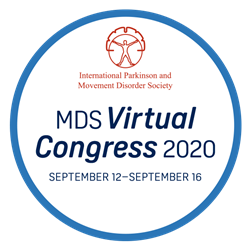
MDS Virtual Congress 2020
We still do not have a treatment for PD to stop or slow the disease progression, and this is one of the first tested immunizations against alpha-synuclein in PD patients.
MILWAUKEE (PRWEB)
September 11, 2020
Results from a clinical study of the active immunotherapeutic PD01A for Parkinson’s Disease provide basis for a phase II study, according to a study released today at the MDS Virtual Congress 2020.
Although there are many therapeutic treatments for Parkinson’s disease (PD), there remains no approved way to stop disease progression. Aggregation of the alpha-synuclein (aSyn) protein is hypothesized to be an underlying cause of PD. Recent developments in immunotherapies that intervene in the aSyn aggregation provide hope of a disease modifying treatment.
PD01A, an aSyn active immunotherapeutic for patients with PD, underwent a phase I study for long-term safety and immunogenicity. Participants with early PD received immunizations at differing concentrations (randomized) and were re-randomized before receiving a booster. Total time in the study ranged from 228 weeks to 297 weeks. Treatment emergent adverse events (TEAEs), motor status, antibody titers, and cerebral spinal fluid (CSF) antibody concentrations were recorded. Although some participants experienced a transient skin reaction, no patient discontinued the study due to TEAEs. Motor symptoms were stable throughout the four years of the study, and the oligomeric aSyn of interest in the CSF was reduced.
Brit Mollenhauer, Attending Physician at Movement Disorder Paracelsus-Elena-Klinik and Assistant Professor at University Medical Center Goettingen in Kassel, Germany states, “We still do not have a treatment for PD to stop or slow the disease progression, and this is one of the first tested immunizations against alpha-synuclein in PD patients. This approach is an active immunization with a short antigenic peptide formulation in a small set of patients, that is not given in the abstract, but from the press release from 2014 is n=12 from a single center. The sample and data analysis has taken a long time, but the decrease in oligomeric aSyn in cerebrospinal fluid with a correlation and improvement of motor symptoms in the higher dose regimen is very promising. No clinical trial has yet reported a substantial improvement in motor symptoms, but even a stabilization as reported here would be important. Nevertheless, this is a small cohort and needs further validation. Other companies are currently carrying out passive immunizations in larger, multi-center phase 2 trials, and the field is very eager for positive results to stop the disease.”
About the MDS Virtual Congress 2020: Meeting participants will learn the latest research findings and state-of-the-art treatment options in Movement Disorders, including Parkinson’s disease. Over 14,000 physicians and medical professionals from more than 130 countries will participate virtually to view over 30 hours of educational content and 1,500 scientific abstracts submitted by clinicians from around the world.
About the International Parkinson and Movement Disorder Society: The International Parkinson and Movement Disorder Society (MDS), an international society of over 8,500 clinicians, scientists, and other healthcare professionals, is dedicated to improving patient care through education and research. For more information about MDS, visit http://www.movementdisorders.org.
Share article on social media or email:

